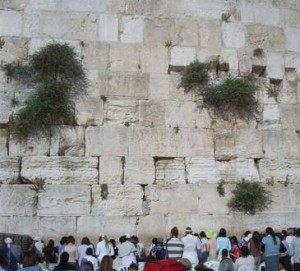Siege of the First Temple on Tenth of Teves
(Taken from excerpts of a 1984 address by the Lubavitcher Rebbe, Rabbi Menachem M. Schneerson, on the Jewish fast day of 10th of Teves [or Tevet], 5745. With permission, as published in Sichos in English, Vol. 24. In 20’23/5783 this day falls on Jan. 3.)
What is special about the [Jewish] fast of the 10th of Teves*
[The 10th of the month of Teves in the Hebrew calendar is] the day in which the siege on Jerusalem started. As the [Book of the] Prophet Ezekiel says, “… The king of Babylon has invested [i.e. surrounded] Jerusalem…” [Ezekiel 24:2]
… Historically, the four [Jewish] fasts associated with the destruction of the Holy Temple occurred in a sequence. The 17th of Tammuz which commemorates the day when the walls of Jerusalem were breached [in mid-summer], came after the period of siege initiated on the 10th of Teves. The 9th of Av and the destruction of the Temple [3 weeks later] came as a result of, and in sequence to, the 17th of Tammuz, and the [Jewish] fast of [the assassination of the appointed governor] Gedaliah followed the day and events of the 9th of Av.
… The Prophet [Ezekiel] tells us that the 10th of Teves was the start of this process – if not for the start, the subsequent calamities would not have followed. If the Jews had acted properly and repented after that 10th of Teves, the sequence of tragic events would have ceased. Everyone understands that even in elementary things, when you don’t let something start and you nip it in the bud, it is simple to stop it later. If you allow a bad thing to start, then, just as one good thing brings another, so too, in the realm of evil. The 10th of Teves brought us to the 17th of Tammuz, the Ninth of Av, and the [Jewish] Fast of Gedaliah. …

The threat on that day also provided an opportunity
One aspect of [the Jewish people’s] role in exile is to teach the Gentile world the Seven Noahide Laws as transmitted by G-d through Moses. … The Prophet [Ezekiel] says that on the 10th of Teves, “the king of Babylon surrounded Jerusalem on this same day.” [In this verse,] the Hebrew word “somach” [surrounded] has the meaning of “closeness.”
When the enemies of the Jews laid siege to the Holy City, at the same time they also brought themselves in close proximity to the Jews, so that [by Divine Providence] the Jews could more easily influence them. No need to travel far and wide to find Gentiles, they are right outside the walls of Jerusalem. Go out and influence them! In this way they are “helping” the Jews to fulfill their responsibility of teaching them.
Jews have a responsibility to the Gentiles
Rambam writes [in Mishneh Torah]: “it is forbidden to take by robbery anything… Even a Gentile must not be robbed.” He brings the non-Jew into the case. The Alter Rebbe in his Code of Jewish Law rephrases this: “It is forbidden to rob… either from a Jew or from a Gentile, either an adult or a child.” He puts in a phraseology of “either — or” and brings the [mention of the] Gentile even closer [to the Jew].
This emphasizes and underlines our relationship and responsibility to non-Jews, to use the opportunities which present themselves to teach them the Seven Noahide Laws… We must remember that the walls are still complete and if we use this opportunity, no further calamity will occur. So let this day be converted to a holiday of joy and rejoicing, by the redemption led by [the true Messiah,] our righteous Moshiach. As the Previous Rebbe said, we just have to “polish the buttons of the uniforms” in order to be ready to greet Moshiach.
While we are in the last moments of the golus [“exile,” whether physical or spiritual], there should be effected the unity of Torah, Divine worship and charity… This makes the exile a place as where even “Jacob lived” [in Egypt (Genesis 47:28)], a truly good life. [This means:] connected to the “Torah of life” and the “G-d of life” in the spiritual “land of life,” wherever Jews may find themselves, until we merit to go to [Israel,] the physical “land of life,” “with our youth and elders, sons and daughters,” with the unity of our people, our Torah and our Land.
We are speaking here of the complete Land of Israel. First and foremost, this is the land of the Seven [Canaanite] Nations which should be returned peacefully to the Jewish people.
_______________________________________________________________
A Note from Ask Noah
Rabbi Moshe Weiner, author of The Divine Code (in English) and Sheva Mitzvot HaShem (in Hebrew), says that the only point upon which an individual Noahide could justify fasting on the 10th of Teves, or the 17th of Tammuz (the date when the wall of Jerusalem was broken through), or the 9th/Tisha B’Av (the date when the First and Second Holy Temples were destroyed) is that he is mourning the temporary (but far too long) destruction of the Holy Temple, and the exile of the Divine Presence from being revealed in the world. Since this mourning is a permitted activity, it depends on his intention.
However, in this final generation of spiritual exile (which will be the first generation of the Messianic Era), people are not nearly as physically strong as they used to be. Therefore it is recommended that fasting should be minimized (e.g. by lighter and/or shorter fasting), if done at all, for those who are not obligated. Certainly a Noahide who has a medical problem should not fast if there is any health risk involved, or he should consult with his doctor as to what he can safely do.

How to accomplish a daily mission
Furthermore, the continuous obligation of Noahides is “yishuv olom,” improving the condition of the world, and one who is weakened by fasting might fall short, G-d forbid, in what he could have accomplished that day for yishuv olom. Also, if fasting causes one to become irritable, short-tempered or prideful, G-d forbid, there could be an actual bad effect from the fasting, which is the opposite of what needs to be accomplished!
In our days it is very acceptable to substitute non-obligatory fasting with donations to proper charities (the value of at least one normal meal is suggested). Recommended charities are those which are consistent with Torah-true principles and yishuv olom – for example, properly teaching and promoting the Noahide Code. Also, the main practical intention is not for fasting, but for repentance.
Therefore, on this day or any day, you can certainly increase in deeds of goodness and kindness for others, especially in giving donations to proper charities (which are not in conflict with Torah laws or morals).
Certainly, a Noahide is encouraged to pray – as often as he wants – that the Third Holy Temple shall be established by the true Messiah from the dynasty of King David (“Moshiach ben David”) very speedily in our days.
_______________________________________________________________
*For more information, listen to this audio history lesson: https://asknoah.org/audio/tenth-of-tevet
